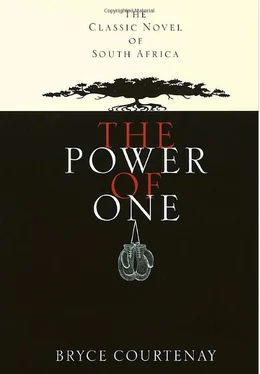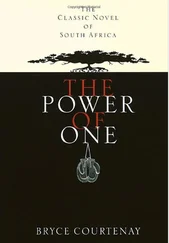Брайс Куртенэ - The Power of One
Здесь есть возможность читать онлайн «Брайс Куртенэ - The Power of One» весь текст электронной книги совершенно бесплатно (целиком полную версию без сокращений). В некоторых случаях можно слушать аудио, скачать через торрент в формате fb2 и присутствует краткое содержание. Жанр: Современная проза, на английском языке. Описание произведения, (предисловие) а так же отзывы посетителей доступны на портале библиотеки ЛибКат.
- Название:The Power of One
- Автор:
- Жанр:
- Год:неизвестен
- ISBN:нет данных
- Рейтинг книги:3 / 5. Голосов: 1
-
Избранное:Добавить в избранное
- Отзывы:
-
Ваша оценка:
- 60
- 1
- 2
- 3
- 4
- 5
The Power of One: краткое содержание, описание и аннотация
Предлагаем к чтению аннотацию, описание, краткое содержание или предисловие (зависит от того, что написал сам автор книги «The Power of One»). Если вы не нашли необходимую информацию о книге — напишите в комментариях, мы постараемся отыскать её.
The book is made to movie with the same name.
The Power of One — читать онлайн бесплатно полную книгу (весь текст) целиком
Ниже представлен текст книги, разбитый по страницам. Система сохранения места последней прочитанной страницы, позволяет с удобством читать онлайн бесплатно книгу «The Power of One», без необходимости каждый раз заново искать на чём Вы остановились. Поставьте закладку, и сможете в любой момент перейти на страницу, на которой закончили чтение.
Интервал:
Закладка:
I arrived at the gates of the prison which were made of wrought iron and locked with a huge chain and padlock. It was the biggest lock I had ever seen, nearly twice the size of a grown-up’s hand. I wondered how big the key would have to be to open it. The gate seemed about twelve feet high and along the top there were pipes welded every two feet or so. They were about three feet long, bent inward at a thirty-degree slant threaded with strands of barbed wire six inches apart and set into huge blocks of blue granite. Without thinking I identified the components of the rock, mainly felspar and quartz, quarried in the Barberton district so in addition it contained a fair amount of mica. After a year with Doc it had become second nature to identify almost anything that didn’t move and I was an expert at the geology of the district.
I decided that escape from inside the wall would be impossible. Set high up to the side of the gate was a church bell and from it, hanging almost to the ground, was a rope. A sign fixed onto the wall said, Ring for attention. My heart beat wildly as I tugged on the rope and the noise from the bell seemed deafening as it cracked the silence. Almost immediately, a warder carrying a rifle slung over his shoulder came out of the guard house some twenty feet from the gate and walked towards me. His highly polished black boots made a scrunching sound on the white gravel driveway. I handed my note to him through the bars of the gate and he opened it suspiciously. He looked at the note for a bit and then looked up at me.
‘ Praat jy Afrikaans?’ he asked.
I nodded my head, indicating to him that I understood Afrikaans. The swelling in my tongue had subsided and while my voice had very little volume and sounded a bit gravelly I could talk quite clearly through my wired-up mouth. The young guard looked relieved and started to talk in Afrikaans. He asked me to read the note as he didn’t have much English, coming from the North Western Transvaal where only the taal is spoken. ‘It says that I am here to visit Professor Von Vollensteen and have permission from Kommandant Van Zyl,’ I told him.
‘I will get on the telephone and ask. Better wait here, you hear.’ He walked over to the guard house and I could see him talking on the phone. He was quite young and looked nervous. Finally he replaced the receiver and stuck his head out of the door. ‘Kom!’ he beckoned to me. But the gate was locked and he shook his head in exasperation and disappeared to return with a very large key on a huge ring. To my surprise the gates opened smoothly and closed with a clang as he locked them behind me.
The young warder told me to report to the office in the administration block and pointed it out to me. ‘ Totsiens and thanks for reading the note, you are a good kêrel ,’ he said.
The area between the gate and the administration block was completely bare. Lawn stretched from either side of the gravel driveway for about five feet and thereafter the square turned into a parade ground of sun-hardened red clay. The strip of living green on either side of the pathway was a brilliant though incongruous contrast to the baked earth of the parade ground and the dead blue-grey walls and buildings. I could see a warder’s head in the window of a little tower built onto and jutting out from the wall. There was a stretch of walkway for fifty feet on either side of the tower. Two guards with rifles slung over their shoulders paced up and down this walkway. I seemed to be the only person on the ground below them and I wondered how, on my way out, they’d know I wasn’t a prisoner trying to escape. Maybe they’d give me a white flag to carry or something.
It was one of the longest walks of my life. I could sense the oppression of the place, the terrible silence. Without trees, no cicadas hummed the air to life. No birds punctuated the stillness. My bare feet on the gravel made an exaggerated sound. There were tiny dark windows arranged three storeys high. Each was divided by two vertical steel bars. I imagined hundreds of eyes hungrily devouring my freedom as they watched from the prison darkness.
The door of the administration block was open, and after hesitating I put my head around it. Inside was a small hallway that had the same wax polish smell of the magistrates’ courts. Three benches, arranged like church pews, filled half the hallway and there was a window with bars set into a wall. Through the bars I could see an office. I walked into the hallway and sat on the front bench and waited.
I don’t know how long I sat there, but it seemed to be a very long time. I could see two men in uniform pass the grille window occasionally, but they never looked out. I could hear them talking on the phone. After I’d been there for ages and ages I heard the voice of a man on the phone behind the grille, he was shouting in Afrikaans and seemed very angry.
‘He hasn’t arrived, you domkop! Are you sure you directed him to this building? We can’t have a blêrrie kid walking around the prison. It’s been almost half an hour and there’s no sign of him. We’ll have to look for him now and it’s all your blêrrie fault!’ I could hear the receiver being slammed back into its cradle. ‘Kom!’ I heard the voice say to someone else and a moment later a door opened and a big man followed by another big man who looked younger than the first one came out.
The big man saw me as he entered the hallway. ‘Jesus Christ! Where have you been?’ he shouted at me.
‘I been here, I been here all the time, Meneer,’ I rasped.
‘Well, why didn’t you make yourself known then?’ he asked in a slightly mollified voice, possibly because he had noticed my wired jaw.
I pointed to the two notices on the wall behind the benches. ‘It says on that notice, Wait here, and on that other one it says, Silence,’ I replied fearfully.
The younger of the two suddenly laughed. ‘I think the kid won the first round, lieutenant,’ he said.
‘Okay, man, I admit you got me there fair and square,’ the older one chuckled. ‘Kom, we must take down your name and things.’
They led me into the office and after taking my name, address and age the older one made a phone call and asked to speak to the Kommandant. Then he put the phone down. ‘The Kommandant wants to see you but he’s doing an inspection now, we have to wait twenty minutes.’ He turned to the younger warder. ‘Klipkop, get Peekay here a cup of tea and a biscuit.’ I wondered how someone could be called ‘Klipkop’. In Afrikaans it means stone head. But when I looked at the tall, blond man, his rawboned features looked as though they could well have been carved out of stone.
Klipkop rose and held out his hand. ‘Seeing we’re going to be here for a while we might as well introduce ourselves. Oudendaal, Johannes Oudendaal,’ he said formally in the Afrikaans manner, giving his surname first then repeating it attached to his Christian name. ‘This is Lieutenant Smit.’ He indicated the older warder, who stretched out his hand without looking at me and I took it briefly, blushing with embarrassment. I wondered whether Captain Smit was related to Jackhammer Smit, maybe his brother? But I didn’t have the courage to ask. After all, Smit is a pretty common Afrikaans name. If he was, I hoped he was a better type than the miner. ‘Come, I’ll show you where we make tea,’ Klipkop said. ‘There’s a Kaffir who makes it but if we want a cup in between we make it ourselves, it’s very handy. Every week we put in a shilling for milk and sugar and biscuits, but the authorities supply tea. You got to watch the Kaffir, or the black bastard pinches everything. I’m telling you, man, this place is full of thieves.’
I followed him into a small kitchen behind the office and he put water into an electric jug and plugged it in. ‘Peekay, that’s a name I haven’t heard before.’
Читать дальшеИнтервал:
Закладка:
Похожие книги на «The Power of One»
Представляем Вашему вниманию похожие книги на «The Power of One» списком для выбора. Мы отобрали схожую по названию и смыслу литературу в надежде предоставить читателям больше вариантов отыскать новые, интересные, ещё непрочитанные произведения.
Обсуждение, отзывы о книге «The Power of One» и просто собственные мнения читателей. Оставьте ваши комментарии, напишите, что Вы думаете о произведении, его смысле или главных героях. Укажите что конкретно понравилось, а что нет, и почему Вы так считаете.












